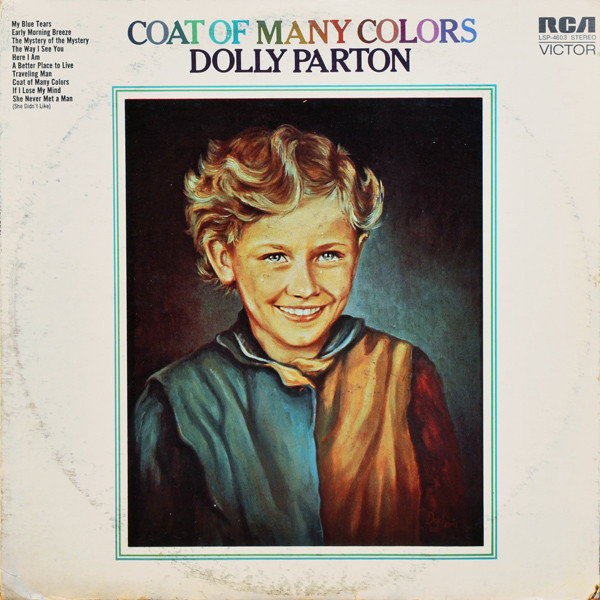DOLLY YOUR ENTHUSIASM (20)
By:
March 1, 2023
One in a series of 25 enthusiastic posts, contributed by 25 HILOBROW friends and regulars, on the topic of favorite Country singles from the Sixties (1964–1973). Series edited by Josh Glenn. BONUS: Check out the DOLLY YOUR ENTHUSIASM playlist on Spotify.

DOLLY PARTON | COAT OF MANY COLORS | 1971
A bittersweet childhood recollection turned modern-day parable of love, faith, and riches greater than money, Dolly Parton’s “Coat of Many Colors” recalls a time when she lacked a coat as winter approached. Using giveaway scraps, her Mama “made my coat of many colors that I was so proud of.” A distant organ helps to conjure Mama sewing while telling a Bible story, of Joseph’s Coat of Many Colors. The Nashville Edition join Parton at the chorus attesting that her coat of rags reflected true riches, illustrated in love, faith, resourcefulness, cherished music and texts, and pride.
A step-up key change launches the dénouement: “So, with patches on my britches / And holes in both my shoes / In my coat of many colors / I hurried off to school.” Wearing her new coat, excited to have her first school picture taken, Dolly meets with bullying from her peers. Despite their abuses, she holds to the glimmering vision of the coat that she and Mama shared. She tries to convey that vision to her classmates, but they see only poverty.
Poverty is pivotal in this track and a recurrent theme in country music. Richard A. Peterson criticized “Coat of Many Colors” for “class unconsciousness,” inspiring not working-class revolution but pride in one’s poverty. Its final chorus proclaims, “They didn’t understand it and I tried to make them see / One is only poor, only if they choose to be.”
Parton and her song emerged from a particular time and place: mid-twentieth-century Appalachia. In the 1960s Appalachia became the face of American poverty, a national social problem. President Johnson announced his War on Poverty there. Media broadcast Appalachian images of “third-world conditions” in America. The people of Appalachia were depicted from the outside as benighted, premodern others.
“Coat of Many Colors” portrays Parton’s family and experience on her terms, stressing both material poverty and social, spiritual, and cultural riches. In stating that poverty is a choice, her lyric defies the status of impoverished people as characters in other people’s stories and asserts their agency as narrators of their own, insisting, We have choices, too — and I choose not to be poor by your definition. Research shows that working people often invert society’s values, placing human, moral value over economic value to negate their own devaluation and even place themselves above their “social superiors.”
The song’s closing lines echo its message: “Now, I know we had no money / But I was rich as I could be / In my coat of many colors / My mama made for me.” A 2001 Songwriters Hall of Fame inductee, Parton has cited “Coat of Many Colors” as her favorite song of the 3,000 she’s written.

DOLLY YOUR ENTHUSIASM: INTRODUCTION by Josh Glenn | David Cantwell on Porter Wagoner and Dolly Parton’s WE FOUND IT | Lucy Sante on Johnny & June Carter Cash’s JACKSON | Mimi Lipson on George Jones’s WALK THROUGH THIS WORLD WITH ME | Steacy Easton on Olivia Newton-John’s LET ME BE THERE | Annie Zaleski on Tammy Wynette’s D-I-V-O-R-C-E | Carl Wilson on Tom T. Hall’s THAT’S HOW I GOT TO MEMPHIS | Josh Glenn on Commander Cody and His Lost Planet Airmen’s BACK TO TENNESSEE | Elizabeth Nelson on Skeeter Davis’s I DIDN’T CRY TODAY | Carlo Rotella on Buck Owens’ TOGETHER AGAIN | Lynn Peril on Roger Miller’s THE MOON IS HIGH | Erik Davis on Kris Kristofferson’s SUNDAY MORNIN’ COMIN’ DOWN | Francesca Royster on Linda Martell’s BAD CASE OF THE BLUES | Amanda Martinez on Bobbie Gentry’s FANCY | Erin Osmon on John Prine’s PARADISE | Douglas Wolk on The Byrds’ DRUG STORE TRUCK DRIVIN’ MAN | David Warner on Willie Nelson’s WHISKEY RIVER | Will Groff on Tanya Tucker’s DELTA DAWN | Natalie Weiner on Dolly Parton’s IN THE GOOD OLD DAYS (WHEN TIMES WERE BAD) | Charlie Mitchell on Stonewall Jackson’s I WASHED MY HANDS IN MUDDY WATER | Nadine Hubbs on Dolly Parton’s COAT OF MANY COLORS | Jada Watson on Loretta Lynn’s DON’T COME HOME A DRINKIN’ (WITH LOVIN’ ON YOUR MIND) | Adam McGovern on Johnny Cash’s THE MAN IN BLACK | Stephen Thomas Erlewine on Dick Curless’s A TOMBSTONE EVERY MILE | Alan Scherstuhl on Waylon Jennings’s GOOD HEARTED WOMAN | Alex Brook Lynn on Bobby Bare’s THE WINNER. PLUS: Peter Doyle on Jerry Reed’s GUITAR MAN | Brian Berger on Charley Pride’s IS ANYBODY GOING TO SAN ANTONE.
JACK KIRBY PANELS | CAPTAIN KIRK SCENES | OLD-SCHOOL HIP HOP | TYPEFACES | NEW WAVE | SQUADS | PUNK | NEO-NOIR MOVIES | COMICS | SCI-FI MOVIES | SIDEKICKS | CARTOONS | TV DEATHS | COUNTRY | PROTO-PUNK | METAL | & more enthusiasms!
